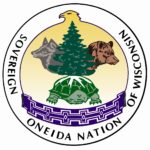Oneida Trust: An Investment Portfolio with a Voice
By Susan White, Trust Director, Oneida Trust Committee of the Oneida Tribe of Indians of Wisconsin
 Did you know that Native Americans were the last group of people allowed to vote in the United States? Even though we fought on behalf of the colonists during the Revolutionary War, it wasn’t until 1924 that Congress granted citizenship to all Native Americans born in the U.S. Even then, it wasn’t until 1957 that all eligible Native Americans were allowed to vote, as the right to vote was governed by state law.
Did you know that Native Americans were the last group of people allowed to vote in the United States? Even though we fought on behalf of the colonists during the Revolutionary War, it wasn’t until 1924 that Congress granted citizenship to all Native Americans born in the U.S. Even then, it wasn’t until 1957 that all eligible Native Americans were allowed to vote, as the right to vote was governed by state law.
Having our voices heard is, in many ways, better than money.
As a citizen of the Oneida Tribe of Indians of Wisconsin, I am proud of our historic and cultural traditions. Our Oneida Elders made sure that the generations that followed would have opportunities that they themselves never had. They never relinquished our legal status or sovereignty. Today in the U.S., tribal governments have a unique status, similar to that of the states. This legal status is the very foundation on which we were able to pull ourselves out of a stagnant and poor economic plight.
Our Elders also implemented sound financial practices, including the creation of a trust, even when our Tribe had very little. When we settled a large land claim in 1967 for a Treaty violation in 1831, the Tribe received a small settlement—but it was a beginning. The Elders designed the trust to become sustainable and perpetual.
The Tribe’s key economic development strategy is gaming. We know that this is different from many sustainable and responsible investors and that our elder’s vision and strategy now gives us a voice—as shareholders. Our investment portfolio has a mission. As we invest and grow our trust funds, we can now participate in a way that can make a positive change in our world, for our brothers and sisters in Indian Country and our neighbors, as well.
As investors, we have the opportunity to engage with multinational corporations about the positive changes they can make on environmental, social, and governance issues, which we believe increase shareholder value.
We have been involved in several shareholder discussions to help educate corporations about the harm they, sometimes unknowingly, commit. Take the Crazy Horse name, for example. For the American Indian community, Crazy Horse is not just a legendary warrior. He is also considered a great teacher, spiritual leader, and role model. His descendants are, understandably, very protective of the name. Several corporations have, without authorization, used his name and likeness to sell their brand. Hornell Brewing Company, brewers of Crazy Horse Malt Liquor, and Liz Claiborne have both used his name without the family consent, which the family vehemently objected to. For years, the companies refused calls to change the name of their products, despite protests from Native Americans. They have since discontinued the use of the name. However, not all corporation engagements are contentious. Soon after our initial dialogue, BP changed the name of its Crazy Horse oil field, out of respect to his descendants.
More recently, we have been working to raise awareness about the name of the Washington, D.C., NFL team. The team’s name is a racial slur with long-standing hateful and offensive connotations. The Trust recently co-filed a shareholder proposal with FedEx Corporation (NYSE:FDX), which owns the naming rights to the team’s stadium, asking the company to “respond to reputational damage from its association with the Washington, D.C., NFL franchise team” and its name controversy. FedEx won approval from the Securities and Exchange Commission to omit the resolution from its 2014 proxy, but this issue is not going away.
Today, some tribes have achieved a measure of political and economic influence. As a people, we have a long way to go to achieve economic parity and human rights equality with the rest of America. That is what we, and our many allies in the SRI industry, are working toward.
Editor’s Note: This column originally appeared in the Fall 2014 issue of Trillium’s newsletter, Investing For a Better World.







